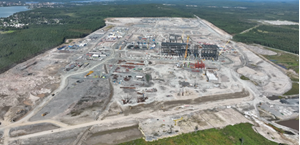News
Stegra wins state aid from the Industrial Leap and the Swedish Energy Agency
The Swedish Energy Agency announced that Stegra has been granted about €100 MM from the Industrial Leap for its establishment of a fully integrated near-zero emission steel production facility in Boden. Earlier this year, the European Commission approved, under the EU State aid rules, a €265-MM Swedish measure made available in part through the Recovery and Resilience Facility to support Stegra (previously H2GS AB) in setting up a large-scale green steel plant. In its decision the European Commissions pointed out that investments like Stegra are important for reaching EU's climate targets Today’s decision by The Swedish Energy Agency, accounts for a part of the total budgeted amount.
“The Swedish support programs are essential for the establishment of new large-scale industry in Sweden. The funds from the Industrial Leap now signal that there is national backing for one of Sweden’s largest industrial projects. It also contributes to some levelling of the playing field, in relation to steel companies in Europe that have received large support packages. This creates the prerequisites for us to build up a long term sustainable and competitive industry in Sweden,” said Henrik Henriksson, CEO Stegra.
Implementing change towards sustainable solutions in the steel industry has historically been slow and subsidies to the high-emitting incumbent players have been high. This is beginning to change with the revised Emission Trading System where the free allocation is gradually phased out, and the Carbon Boarder Adjustment Mechanism, which is phased in step by step. State aid can be used to help speed up change until those regulation changes are fully implemented, as well as to level the playing field between established players and new cleantech companies. For highest impact, state aid should be allocated to the most efficient projects.
“Swedish industrial companies have the potential to become world leaders while contributing to the green transition of society as a whole. Initiatives within the Industrial Leap are of great importance for both the climate and the competitiveness of our industry,” said Caroline Asserup, Interim Director General at the Swedish Energy Agency.
Stegra’s Boden plant is the industry initiative that avoids the most emissions per invested Swedish Krona. Our application entails on average 28 kg of CO2-avoidance per support-krona. No other Swedish project achieves as big positive climate impact per invested support-krona as Stegra.
All Stegra’s climate calculations are based CINEA’s methodology. CINEA is the European Climate, Environment and Infrastructure Executive Agency and the European Commission agency which manages decarbonization and sustainable growth. The calculations have been verified by an external expert (DNV) and all the input data has been validated by an independent auditor (PWC) via an ISRS4400 audit.


